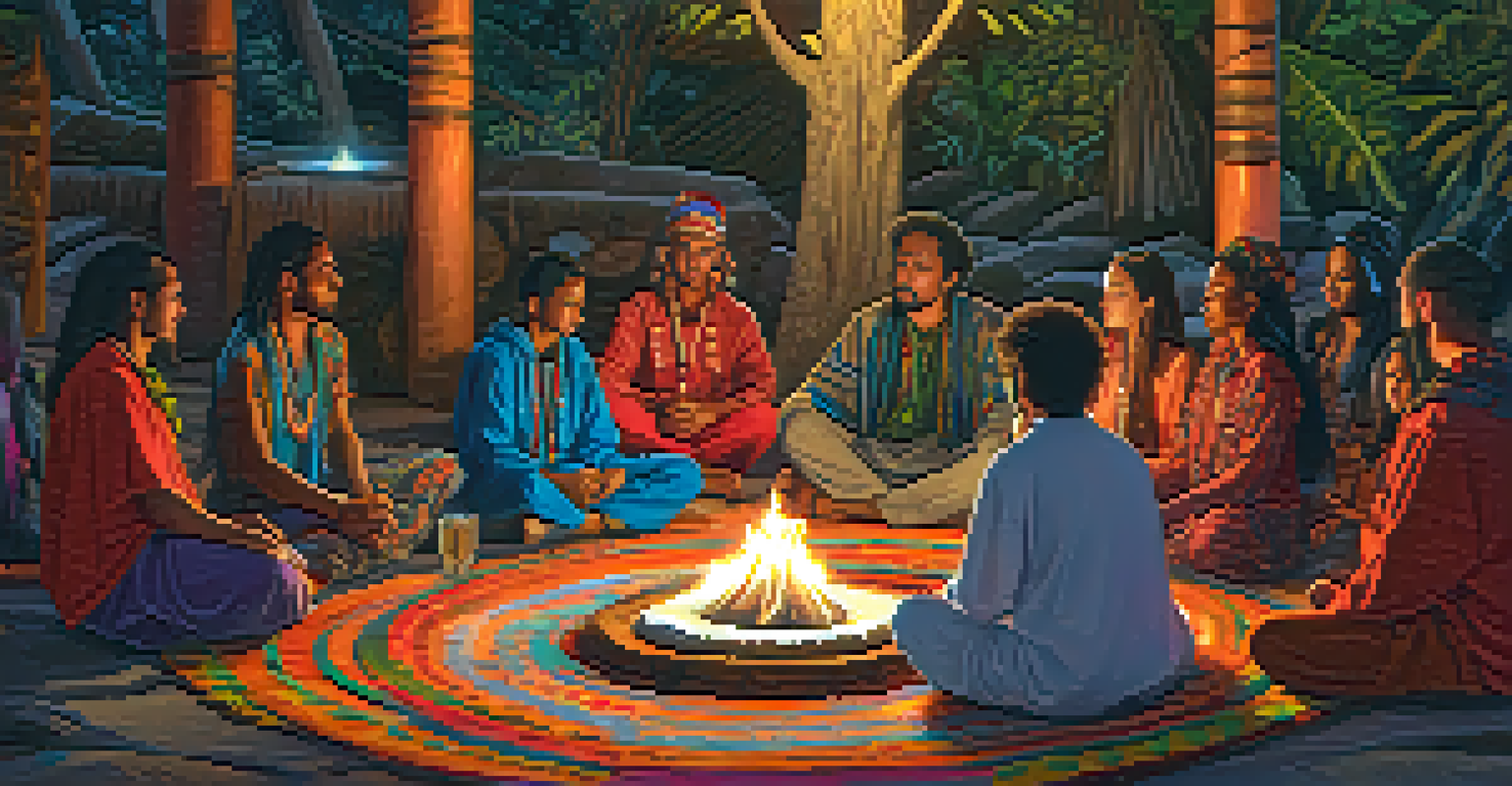The Role of Ayahuasca in Indigenous Healing Practices

Understanding Ayahuasca: A Sacred Plant Medicine
Ayahuasca, derived from the Banisteriopsis caapi vine and other plants, has been used for centuries in indigenous cultures, particularly in the Amazon basin. This powerful brew is known for its psychoactive properties, which can lead to profound spiritual experiences. The term 'Ayahuasca' translates to 'vine of the souls,' highlighting its role in connecting individuals with deeper realms of consciousness.
Ayahuasca is not only a drink; it's a way of life, a bridge to the spiritual world, and a means for healing.
Traditionally, Ayahuasca is consumed during ceremonies led by shamans, who serve as guides for participants on their journeys. The experience can evoke intense emotions and visions, allowing individuals to confront personal traumas or gain insights into their lives. This process is integral to the healing practices of many indigenous communities, as it fosters personal growth and emotional release.
Moreover, Ayahuasca is not just a physical substance; it embodies a spiritual philosophy that emphasizes interconnectedness with nature, ancestors, and the universe. This holistic approach to healing is a cornerstone of indigenous beliefs, making Ayahuasca a vital tool in both individual and communal wellness.
The Historical Context of Ayahuasca Use
The use of Ayahuasca dates back millennia, with archaeological evidence suggesting its importance in Amazonian cultures. Indigenous tribes have passed down knowledge about the plant's properties through generations, often intertwined with their cultural and spiritual beliefs. This long-standing tradition underscores the significance of Ayahuasca beyond mere ritual, framing it as a vital aspect of their identity.

Historically, Ayahuasca served not only as a medicinal remedy but also as a means of connecting with spiritual dimensions. Shamans, revered as healers and mediators, would use the brew to access visions, communicate with spirits, and diagnose ailments. This practice reflects a worldview where physical and spiritual health are inextricably linked.
Ayahuasca's Healing Power Explored
Ayahuasca ceremonies provide profound psychological benefits, helping individuals confront trauma and promote emotional healing.
As globalization has increased, so too has the interest in Ayahuasca from outside cultures, leading to both opportunities and challenges for indigenous communities. The influx of tourists seeking authentic experiences can sometimes overshadow the cultural significance of these ceremonies, raising concerns about cultural appropriation and the commodification of sacred practices.
Ayahuasca in Healing Rituals: Structure and Significance
Ayahuasca ceremonies are often deeply structured events, typically held at night and involving a group of participants. The ritual begins with prayers and intentions set by the shaman, creating a sacred space for healing to occur. This preparation is crucial, as it establishes an atmosphere of respect and openness, allowing participants to engage fully with the experience.
The plant medicine experience is a sacred journey of self-discovery, healing, and profound interconnectedness with all living things.
During the ceremony, participants consume the Ayahuasca brew and enter a state of heightened awareness, often experiencing vivid visions and emotional releases. The shaman plays a vital role, guiding participants through their journeys with songs, known as icaros, that are believed to channel healing energies. This guidance is essential for navigating the often challenging emotional landscapes that arise during the experience.
The collective nature of these ceremonies fosters a sense of community among participants, reinforcing social bonds and shared healing experiences. This communal aspect is particularly significant in indigenous cultures, where individual healing is seen as interlinked with the health of the entire community.
The Psychological Benefits of Ayahuasca
Numerous studies suggest that Ayahuasca can have profound psychological benefits, particularly for those struggling with trauma or mental health issues. Participants often report significant reductions in symptoms of anxiety, depression, and PTSD following ceremonies. This transformative potential is one reason why interest in Ayahuasca is growing beyond indigenous communities.
The experience of confronting deep-seated fears and emotions during an Ayahuasca session can lead to catharsis and healing. Many individuals describe feeling a sense of clarity and purpose after their journeys, as if they've unearthed hidden truths about themselves. This process not only promotes emotional healing but also fosters personal empowerment and self-discovery.
Cultural Significance of Ayahuasca
Historically, Ayahuasca serves as a vital aspect of identity and spiritual connection for indigenous cultures, emphasizing the need for respectful engagement.
Furthermore, the connections formed during these ceremonies can provide ongoing support networks, as participants often bond over their shared experiences. This sense of community and understanding can be invaluable in the healing journey, creating a space where individuals feel safe to explore their vulnerabilities.
Challenges and Controversies Surrounding Ayahuasca Use
Despite its benefits, the use of Ayahuasca is not without controversy. Concerns about safety, particularly regarding the brew's interaction with other medications, have prompted discussions about responsible use. It is essential for individuals considering Ayahuasca to conduct thorough research and ideally seek guidance from knowledgeable practitioners.
Additionally, as the popularity of Ayahuasca grows, so does the risk of exploitation and misrepresentation. Some retreats and shamans may prioritize profit over the well-being of participants, leading to experiences that lack the depth and respect essential to traditional practices. This highlights the importance of finding reputable, culturally-informed facilitators who honor the traditions of indigenous healing.
Cultural appropriation is another critical issue, as many non-indigenous individuals seek out Ayahuasca experiences without understanding the cultural context. This can dilute the significance of the rituals and undermine the very communities that have safeguarded this sacred knowledge for generations. Advocating for ethical and respectful engagement with Ayahuasca practices is vital.
Ayahuasca's Role in Spiritual Growth and Awareness
For many, Ayahuasca serves as a catalyst for spiritual growth and heightened awareness. The intense experiences often lead to profound realizations about one's life, purpose, and connection to the universe. This journey of self-discovery is a key aspect of why individuals are drawn to Ayahuasca, seeking insights that can transform their understanding of existence.
Participants frequently report feelings of interconnectedness with nature and a deeper appreciation for life. This sense of unity can inspire individuals to make positive changes in their lives, whether through personal development, environmental stewardship, or fostering compassion towards others. Such transformations often extend beyond the individual, benefiting communities at large.
Future of Ayahuasca in Therapy
The integration of Ayahuasca into modern therapeutic practices holds promise, provided it honors the traditions of indigenous communities.
Moreover, the spiritual insights gained during Ayahuasca ceremonies can lead to a renewed sense of hope and direction. Many individuals emerge from their experiences with a clearer vision of their path, encouraging them to pursue their passions and contribute positively to society.
The Future of Ayahuasca in Healing Practices
As interest in Ayahuasca continues to grow globally, the future of its role in healing practices is both promising and complex. There is a potential for greater understanding and integration of Ayahuasca into therapeutic settings, provided that it is approached respectfully and ethically. This could lead to innovative collaborations between traditional healers and mental health professionals.
However, it is vital to ensure that indigenous voices remain at the forefront of these discussions. Empowering indigenous communities to share their knowledge and practices on their terms is essential for preserving the integrity of Ayahuasca traditions. This approach not only respects cultural heritage but also enriches the dialogue surrounding holistic healing methods.

Ultimately, the future of Ayahuasca in healing practices hinges on balance—between honoring traditional wisdom and adapting to contemporary needs. As the world becomes more interconnected, fostering genuine respect for the roots of Ayahuasca can lead to transformative healing experiences for individuals and communities alike.